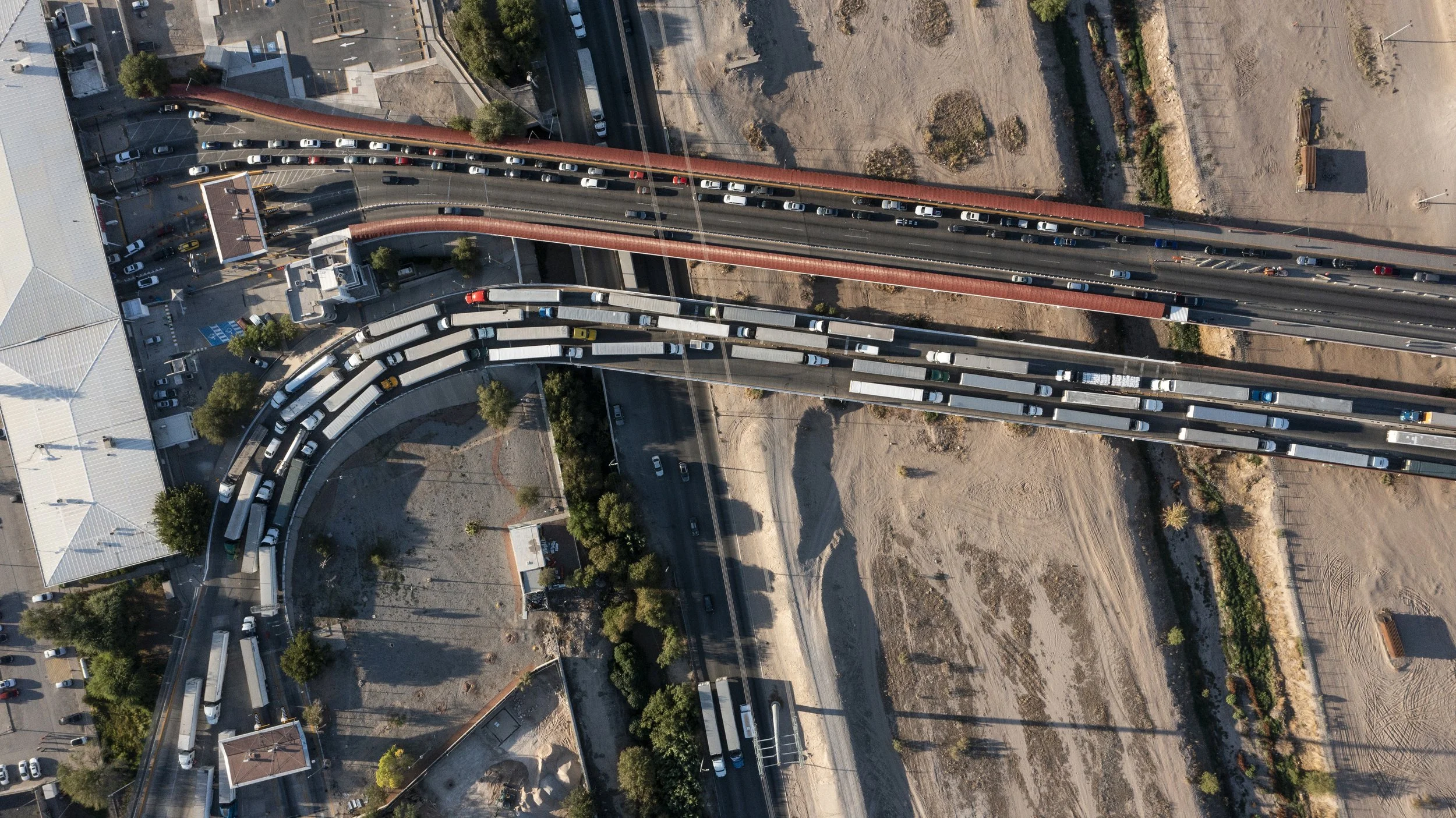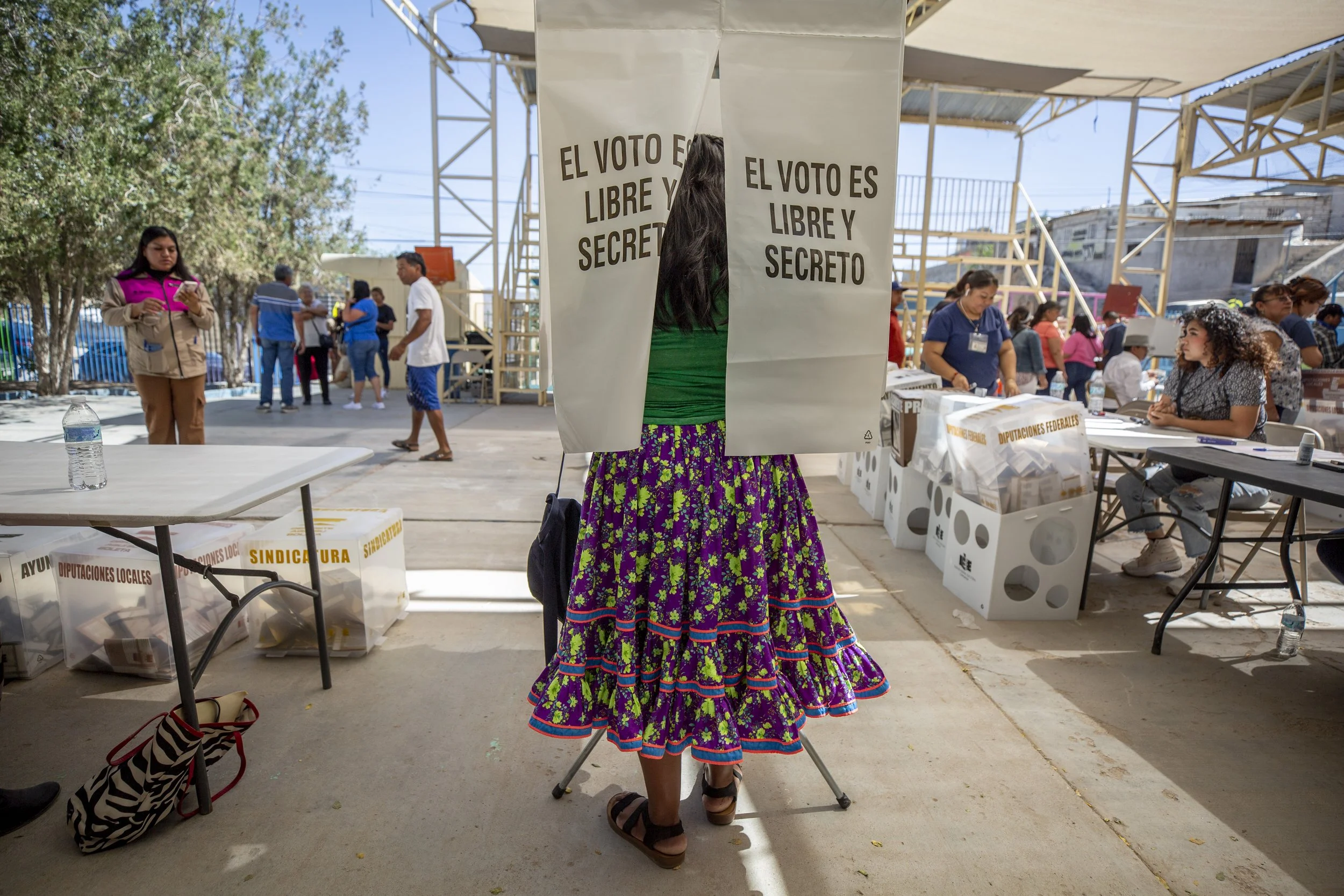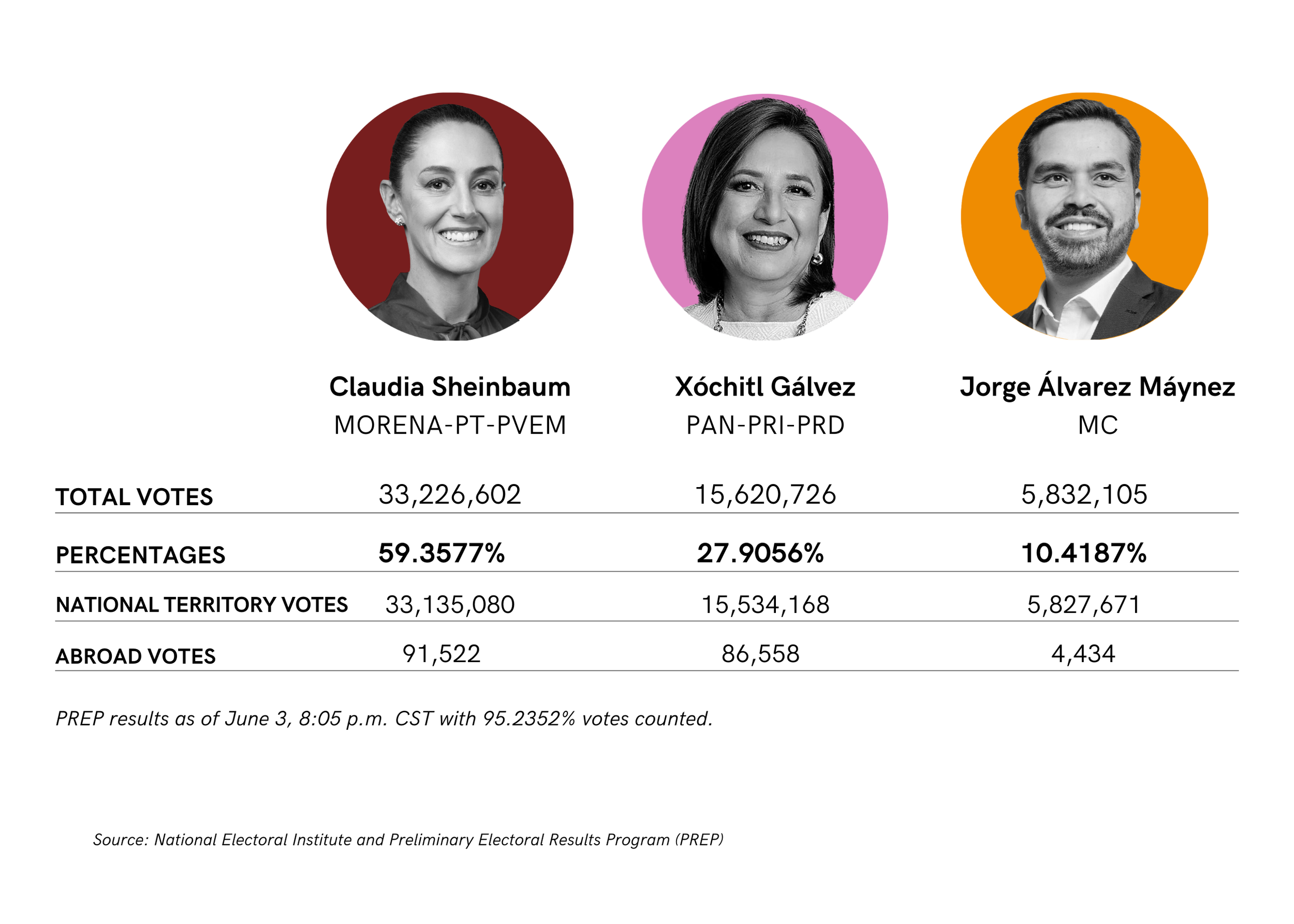Setting a Path After Blowout Win
Claudia Sheinbaum celebrates her victory in Mexico’s presidential election at the zócalo, Mexico City’s main public square, on June 3, 2024. Sheinbaum will be the first woman to serve as Mexico's president. Photo by Francisco Canedo/Xinhua/Alamy
What’s in it for border states with Sheinbaum as Mexico’s newLy elected president?
Editor’s note: This story was co-published with Puente News Collaborative. Puente News Collaborative is a bilingual nonprofit newsroom, convener and funder dedicated to high quality, fact-based news and information from the U.S.-Mexico border.
Angela Kocherga, news director at KTEP public radio, contributed to the story.
Haga clic aquí para leer el reportaje en español.
MEXICO CITY — Outperforming even the rosiest predictions, leftist Claudia Sheinbaum has swept into Mexico’s presidency in a landslide that likely will enable her to accelerate the nationalist-populist program of her patron, who hands over power in four months.
Sheinbaum, 61, took nearly 60% of votes in a three-way race, double the support of her nearest opponent. The ruling Morena party, founded by President Andrés Manuel López Obrador, will control two thirds of both chambers of Mexico’s national congress and 24 of its 32 state governorships.
What Sheinbaum does with that mandate will define Mexico’s economic policy — including treatment of private investment in key industries like energy. Her government must also determine whether and how to alter López Obrador’s lackluster efforts against militarized criminal gangs. And it will be forced to decide on the treatment of hundreds of thousands of global migrants transiting the country enroute to the U.S. border.
‘As supply chains move out of China, Mexico is one of the best-positioned countries in the world to take advantage of this once-in-a-generation opportunity.’
For Texas and other U.S. border states, there’s a lot riding on how Sheinbaum proceeds. Mexico has overtaken China as the main U.S. trading partner, with some $800 billion in goods crossing the border. That trade is expected to jump as manufacturing returns to North America amid growing U.S.-China tensions.
“Texas is the destination, origin and transit point of two thirds of binational trade with Mexico,” said Tony Payán, director of the Center for the U.S. and Mexico at Rice University’s Baker Institute. “The U.S. Mexico relationship runs through Texas, and the Mexican community in Texas is enormous — Dallas Houston, San Antonio Austin, El Paso. We’re talking a very intense relationship.”
Commercial trucks heading into the U.S. at the Zaragoza bridge in El Paso backed up for miles after the Bridge of the Americas was closed to commercial traffic. Photo by Omar Ornelas/El Paso Times
Payán, who is also Professor of Social Sciences at the Autonomous University of Ciudad Juarez, added: “I hope the next administration really, really understands that Washington (D.C.) is not everything. That the state capitals, whether it's Sacramento, in California or Phoenix in Arizona, or Austin in Texas, are the places of power for Mexico City.”
Called the Fourth Transformation, or 4T, the Morena party’s economic and social program is aimed at improving the lot of Mexico’s poor and working class. Under López Obrador, the minimum wage has doubled, labor unions have grown a bit more free and needed cash has been delivered to the aged and other marginalized Mexicans.
In recent years, Mexico’s export-fueled economy has proved resilient. Its “super peso” gained 23% against the U.S. dollar since 2018 and is now considered among the globe’s strongest currencies. But some analysts say López Obrador's anti-capital rhetoric has kept private investor’s money off the table.
“As supply chains move out of China, Mexico is one of the best-positioned countries in the world to take advantage of this once-in-a-generation opportunity,” said Shannon O’Neil, a Mexico expert at the Council on Foreign Relations and author of “The Globalization Myth”, which argues that regional economies like North America’s will emerge as an economic powerhouse in future years.
President Joe Biden met with Canadian Prime Minister Justin Trudeau and Mexican President Andrés Manuel López Obrador at the White House on Thursday, November 18, 2021. The North American leaders discussed trade, the climate crisis, and the coronavirus pandemic. Photo by Adam Schultz/White House
“The next government needs to double down on infrastructure, education, public safety, and clean energy to attract the hundreds of billions of dollars of investment up for grabs,” O’Neil said.
The United States accounts for two thirds of Mexico's global trade, with economic ties reaching deep into the U.S. industrial heartland. With analysts citing the need for dramatic improvement in the electrical grid, highways and other public works, Sheinbaum in her victory speech sought to assure investors that she is open to working with them.
“We will respect entrepreneurial freedom and will honestly promote and facilitate both national and foreign private investment that fosters social well-being and regional development” Sheinbaum said. “Always ensuring respect for the environment.”
Energy investment, which was opened to Mexican and foreign provide investment a decade ago, only to be squelched under López Obrador, presents a critical test for Sheinbaum.
“The commitment to change course on the energy sector was clear with both candidates, yet the political baggage Sheinbaum carries will make it harder for her to move quickly,” said José Antonio Aguilar, a businessman who develops wind farms to generate renewable energy.
Supporters of Claudia Sheinbaum gather at the zócalo to celebrate her victory in Mexico's general election on June 3, 2024. Sheinbaum won approximately 59% of the votes, according to preliminary electoral results released on Monday. Photo by Carlos Tischler/ZUMA Press Wire/Alamy
Sheinbaum's resounding victory over Xóchitl Gálvez, the candidate of a coalition of three opposition parties, might also signify the return of a one-party rule that characterized Mexico’s political system for nearly all of the 20th century.
It was Gálvez’s conservative National Action Party that ushered in greater democracy in Mexico by winning presidential elections in 2000 and then holding the office for 12 years. A member of Gálvez’s failed coalition, the Institutional Revolutionary Party, or PRI, had ruled Mexico for more than 70 years before National Action’s victory.
But a record of mediocre rule by conservative presidents, and the PRI’s disastrous return to the office in 2012, became the foundation for Morena’s hold on power.
Critics fear that Morena’s bolstered political majority enables Sheinbaum — and López Obrador — to weaken civic institutions painstakingly created in the 1990s to safeguard democracy and limit presidential power.
A Mexican indigenous woman casts her ballot for the 2024 Presidential Election in Ciudad Juárez, Mexico on June 2, 2024. Photo by Omar Ornelas/El Paso Times
This year López Obrador sent Congress a number of proposals to alter Mexico’s constitution. The proposals include limiting the power of the autonomous National Elections Institute, which oversees federal votes and direct election of judges, including members of the Supreme Court.
The proposals would also eliminate autonomous agencies that regulate energy, telecommunications and other industries that López Obrador sought to keep under government control by limiting private investment.
Morena lacked the votes to push the measure through the last Congress. But Sheinbaum ran her campaign in part on vows to make the limits a reality. With the Morena coalition's strengthened majority, Congress reconvenes Sept. 1.
Sheinbaum’s 59% of the vote is six points greater than what López Obrador won in a four-way race six years ago.
Gálvez’s tally was far less than that predicted by most opinion polls in recent weeks, including a nationwide survey commissioned by Puente News Collaborative. Most respondents in the Puente poll said Sheinbaum most capable of dealing with the U.S. relationship. The poll suggests that 69% of Mexicans believe Joe Biden would prove better for Mexico, compared with just 11% saying that about Donald Trump.
“Claudia, Morena just swept,” said Francisco Olivarez, who sells newspapers on a corner in Mexico City. “Not even close.”
While Sunday’s vote cements López Obrador’s political legacy, some of his policies haven’t delivered promised results.
Violence remains rampant — with 30,000 murders annually on his watch — as criminal gangs battle one another and security forces. Long financed by smuggling narcotics to users in the U.S., the gangs increasingly rely on migrant smuggling, extortion and other rackets that hurt Mexican communities.
‘We envision a plural, diverse, and democratic Mexico.’
And there are more challenges awaiting Sheinbaum: López Obrador’s doubling down on support of the bankrupt national oil company Pemex, flies in the face of worldwide moves toward a decarbonized planet. And his expensive bets on public works, including a new, underutilized Mexico City airport and a tourist train encircling the Yucatan Peninsula, so far seem like unprofitable vanity projects.
In claiming victory just before midnight Sunday, Sheinbaum sought to calm her critics.
“We envision a plural, diverse, and democratic Mexico,” she said. “We understand that dissent is part of democracy and although the majority of the people supported our project, our duty is and always will be to look after each and every Mexican without distinction.”
Alfredo Corchado is the executive editor for Puente News Collaborative and the former Mexico/Border Correspondent for The Dallas Morning News. He’s the author of “Midnight in Mexico” and “Homelands.” @ajcorchado
Other palabra articles by Alfredo Corchado: A Fresh Cure for Mexico’s Festering Ills?, ¿Una nueva cura para viejos males en México?,In Mexico’s Historic Vote, Politics are Little Changed, Con voto histórico en México, la política cambiaría poco, Words To Live By
Eduardo García established Bloomberg’s Mexico bureau in 1992 and served as its leader until 2001, overseeing the agency’s award-winning coverage in the country. In 2001, he embarked on a new venture by founding his own news organization, Sentido Común. For nearly 18 years, he guided Sentido Común to become one of Mexico's most esteemed financial websites. Later, he merged his company with the local financial news agency Infosel, assuming roles as editor-in-chief and subsequently Chief Content Officer. @egarciascmx
Other palabra articles by Eduardo García: In Mexico’s Historic Vote, Politics are Little Changed, Con voto histórico en México, la política cambiaría poco
Angela Kocherga, an award-winning journalist and news director of the public radio in El Paso, and NPR contributor for regional and national stories about the border. She’s also a co-host for the Texas Standard statewide daily news program. @AngelaKBorder
Other palabra articles by Angela Kocherga: A Fresh Cure for Mexico’s Festering Ills?, ¿Una nueva cura para viejos males en México?,In Mexico’s Historic Vote, Politics are Little Changed, Con voto histórico en México, la política cambiaría poco, El Paso Remembered
Dudley Althaus has reported on Mexico, Latin America and beyond for more than three decades as a staff newspaper correspondent. Beginning his career at a small newspaper on the Texas-Mexico border, Althaus had an award-winning 22-year stint as Mexico City bureau chief of the Houston Chronicle. After a four-year run as a Mexico correspondent for The Wall Street Journal, Althaus covered immigration and border issues as a freelancer based in San Antonio for Hearst Newspapers. He has covered every Mexican presidential election since 1988, when Mexico's troubled transition to democracy began. @dqalthaus
Other palabra articles edited by Dudley Althaus: In Mexico’s Historic Vote, Politics are Little Changed, Con voto histórico en México, la política cambiaría poco













